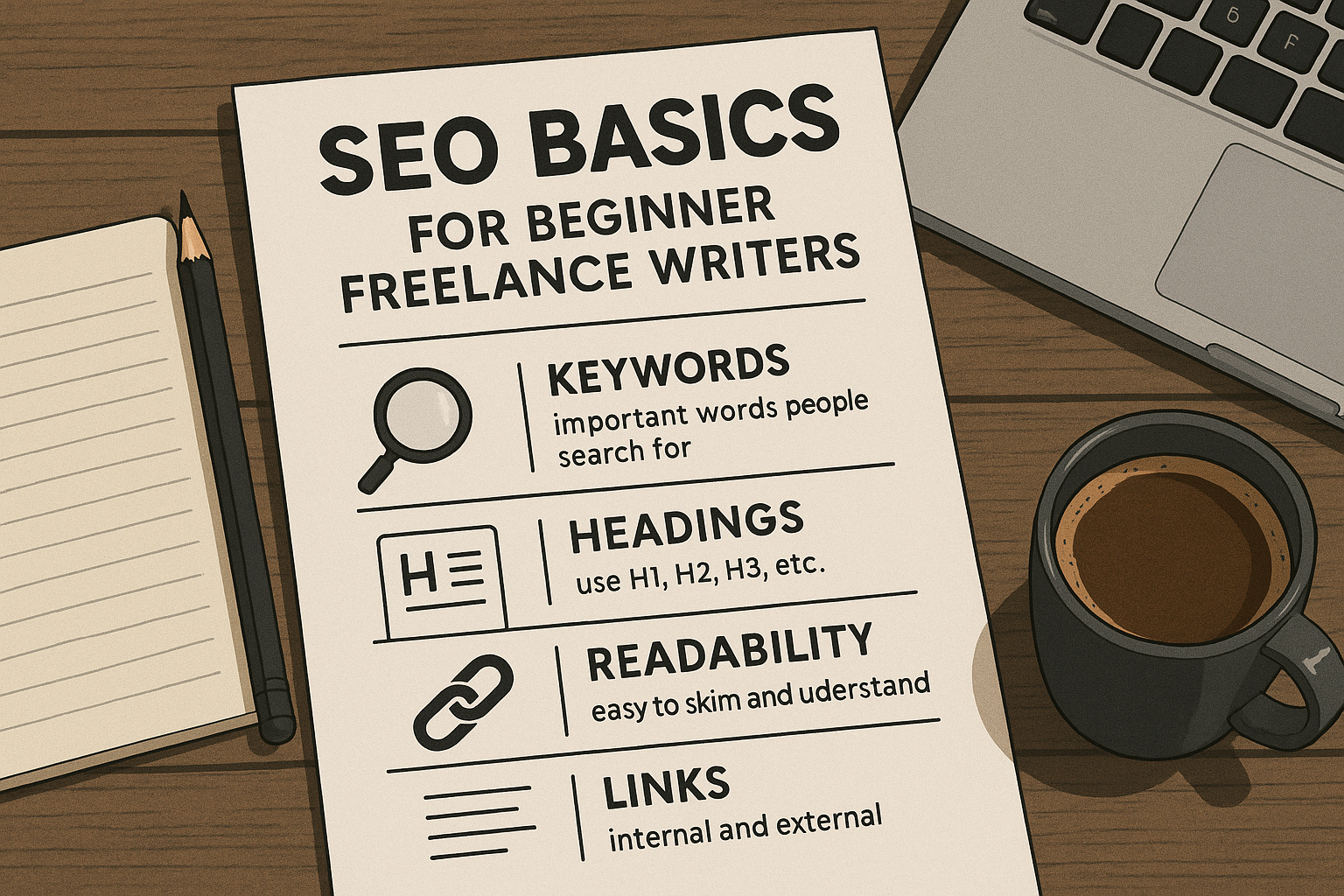If you’re writing for online platforms, understanding SEO (Search Engine Optimization) is a game-changer. It’s what helps content appear on Google — and what gets your clients more traffic, leads, and sales.
As a freelance writer, you don’t need to be an SEO expert. But knowing the basics can dramatically boost your value and help you land better-paying gigs.
This guide breaks down essential SEO principles in a simple, beginner-friendly way — no jargon, just results.
What Is SEO and Why Does It Matter?
SEO is the process of optimizing content so it appears higher in search engine results. The better optimized your article, the more likely people are to find and read it.
Good SEO writing:
- Increases visibility
- Brings free traffic to websites
- Builds trust and authority
- Converts readers into customers
For clients, that means more results from your writing — and for you, it means more work and higher pay.
Core Elements of SEO Writing
Let’s walk through the key components you need to focus on when writing SEO-friendly content.
1. Keywords: What People Are Searching For
Keywords are phrases that users type into search engines.
Example: Someone searching “how to train a puppy” is looking for content with those exact words — or something close to it.
How to Use Keywords:
- Place the main keyword in the title
- Use it naturally in the introduction
- Include it in at least one subheading
- Sprinkle throughout the text (without stuffing)
- Include it in the URL (if applicable) and meta description
Use tools like Ubersuggest, Answer the Public, or Google’s own suggestions to find keywords.
2. Headings and Subheadings (H1, H2, H3…)
Breaking content into clear sections helps search engines understand structure.
Best practices:
- Use H1 for your article title
- Use H2 for main sections
- Use H3 for sub-points under H2s
- Make headings clear, useful, and sometimes keyword-rich
Example:
H2: “Best Dog Breeds for First-Time Owners”
H3: “1. Golden Retriever”
3. Readability: Easy to Skim, Easy to Rank
Search engines love user-friendly content.
To improve readability:
- Use short paragraphs (2–4 lines)
- Add bullet points or numbered lists
- Write in a conversational tone
- Avoid jargon unless necessary
- Use transition phrases (“Next,” “For example,” “On the other hand…”)
4. Internal and External Links
Internal links point to other pages on the same website.
External links point to other trusted sites.
Example:
- Internal: “Check out our guide on crate training puppies.”
- External: “According to the American Kennel Club…”
This shows Google that your content is connected, helpful, and well-researched.
5. Meta Description
The meta description is the short text that appears under your title in search results.
Tips:
- Keep it under 160 characters
- Include your main keyword
- Write something enticing to increase clicks
Example:
“Looking for easy puppy training tips? This beginner’s guide covers everything you need to raise a well-behaved pup.”
Bonus SEO Tips for Writers
Use Synonyms and Related Terms
Google is smart. You don’t need to repeat the same keyword 20 times. Use variations and related phrases.
Example:
Instead of repeating “puppy training,” also use “housebreaking,” “crate training,” or “obedience tips.”
Optimize Image Alt Text
When inserting images, always include alt text describing what the image shows.
Why it matters:
- Improves accessibility
- Helps with image SEO
- Adds context to search engines
Example:
Alt text: “Golden Retriever puppy sitting with a leash in its mouth”
Avoid Keyword Stuffing
Overusing keywords makes writing sound robotic and hurts rankings.
Bad:
“Puppy training is important. Puppy training helps. Puppy training is great.”
Better:
“Training your puppy early builds trust and teaches boundaries in a positive way.”
What Clients Expect From SEO-Savvy Writers
Even if clients don’t provide a keyword, they often expect:
- Keyword research or suggestions
- Naturally optimized content
- Clean structure with clear headings
- A meta description
- Readable, scannable formatting
Letting clients know you understand SEO gives you a competitive edge — even at the beginner level.
Final Thoughts: Master the Basics, Stand Out as a Writer
SEO doesn’t need to be complicated. By mastering these fundamentals, you can write content that both people and search engines love.
When your writing gets found, read, and shared — clients notice. And when they notice, they keep coming back.
Learn the basics. Apply them consistently. Then watch your writing — and career — rise to the top.

Interesting take on bankroll management! Understanding game probabilities, like those offered on jilievo slot download, really shifts your perspective. Solid advice for tournament players!